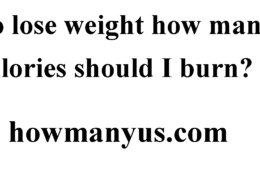To lose weight how many calories should I burn?
The question “To lose weight, how many calories should I burn?” lies at the heart of weight management. It unveils the fundamental principle behind weight loss: creating a calorie deficit. This question is a crucial first step in understanding healthy weight loss practices and setting realistic goals.
Understanding the Inquiry: A Multifaceted Approach
Several factors influence the number of calories you need to burn to lose weight:
Basal Metabolic Rate (BMR): This represents the number of calories your body burns at rest to maintain vital functions. It’s influenced by factors like age, sex, height, and weight.
Activity Level: The calories you burn through daily activities significantly impact weight loss.
To lose weight how many calories should I burn?
Current Weight: Generally, individuals with more weight tend to burn more calories at rest.
Weight Loss Goal: The desired rate of weight loss (e.g., 1 lb per week) influences the calorie deficit needed.
Shedding Light on Calorie Burning for Weight Loss
There’s no one-size-fits-all answer to the calorie burning question for weight loss. However, we can explore key concepts:
To lose weight how many calories should I burn:
Calorie Deficit: To lose weight, you need to burn more calories than you consume. This creates a calorie deficit, prompting your body to tap into stored energy (fat) for fuel.
Safe and Sustainable Weight Loss: Aiming for a gradual weight loss of 1-2 pounds per week is considered safe and sustainable. This typically requires a calorie deficit of 500-1000 calories per day.


Unlocking the Secrets of Healthy Weight Loss
Shedding pounds can feel overwhelming, but understanding calorie burning is a powerful tool. This guide explores how many calories you need to burn to achieve your weight loss goals.
Understanding the Core Factors:
The Science of Calorie Burning:
Calculating Your Calorie Needs:
Important Considerations:
Taking Charge of Your Health!
By understanding calorie burning and creating a sustainable calorie deficit, you embark on a journey towards a healthier you. Remember, this guide provides a general overview, and consulting a healthcare professional is vital for personalized advice.